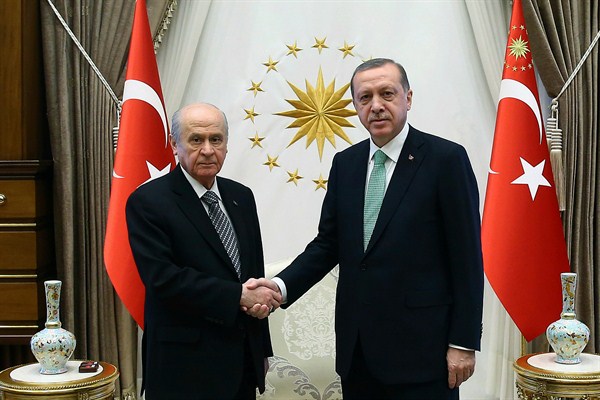On April 16, Turks are set to vote “yes” or “no” on a package of 18 constitutional reforms that would abolish the current parliamentary system of government in favor of a strong executive presidency. The only politician who stands to gain more from the reforms’ passage than President Recep Tayyip Erdogan—who sees them as the flagship project of his political career—is Davlet Bahceli, the long-time leader of the right-wing Nationalist Movement Party, or MHP.
Bahceli has decided to throw his full support behind Erdogan and the “yes” campaign. Indeed, without his support, Erdogan’s allies in parliament from his Justice and Development Party, or AKP, would not have been able to generate the necessary 330 votes to trigger the referendum. In backing the campaign, Bahceli has brought the MHP out of political obscurity and into the limelight—a welcome development for many of the party faithful whose support for Bahceli had soured as the MHP gradually lost political influence in recent years. The party is currently the least represented in Turkey’s 550-seat parliament, with its share of seats having dropped from 79 to 40 in the November 2015 elections. The resumption of hostilities between the Turkish state and the Kurdistan Workers’ Party, or PKK, played a large part in the MHP’s misfortunes at the polls. As the number of casualties among Turkish security forces increased, many nationalists ditched the MHP and voted for the ruling AKP in order to back its fight against Kurdish insurgents.
Bahceli’s decision to support the referendum is motivated by sheer political survival. Following the MHP’s dismal electoral showing in 2015, his two decades of party leadership hung by a thread, with his popularity among members seemingly at rock bottom. In May 2016, polls indicated that under his leadership the MHP could fall below the 10 percent voting threshold needed to remain in parliament for the next elections. That same month, four MHP heavyweights tried to challenge Bahceli’s leadership and organize an extraordinary congress to elect a new head of the party. A protracted court battle ensued over the legality of the maneuver. Only the interference of Turkish riot police, followed by a court order declaring the snap congress illegal, prevented the vote from taking place. MHP dissidents accused the AKP of colluding with Bahceli and of interfering in their party’s internal affairs.

